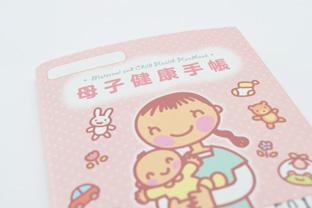Having a Baby

When having a baby in Japan, if neither parent is Japanese (this includes permanent residents), certain procedures must be undertaken.
Pregnant women must register their pregnancy at the local municipal office. They will receive a handbook (“Boshi-Techo”) and a “Haha-to-Ko-no-Kenko- Bag”, filled with all the information and forms necessary for having a baby in Japan. Bilingual versions of the Boshi Techo can be purchased via money transfer at a post office (details below). Regular check-ups with a doctor are a must (a nominal fee may be charged).
Within 14 days of the birth, parents must register the birth at the local municipal office by presenting the child’s birth certificate and boshi techo handbook. They should also apply for a residence card for the child at the immigration bureau within 30 days (child’s passport not required for application) and apply for a passport through their home country’s embassy. If the child will be staying in Japan for less than 60 days, it is not necessary to obtain a residence card for them.

Japanese-English Boshi-Techo
Size: A5 / 84 pages / Price: ¥1320 (including tax & shipping)
Lump-Sum Childbirth and Childcare Allowance
The costs involved in giving birth in Japan will vary between facilities. Charges are borne in full by the parents after the birth, as pregnancy is not covered by public health insurance. However, the health insurance systems will provide support in the form of a “lump sum childbirth and childcare allowance”, to the amount of ¥500,000 per child. If you receive health insurance through work, you should apply for this allowance from your employer. If you are enrolled in National Health Insurance, you should apply through your local municipal office.
Health Insurance

Soon after the birth you should apply for health insurance for the child. Apply through your employer if you are enrolled in Employees’ Health Insurance, or through the municipal office if you have National Health Insurance.
Child Immunization
Japanese preventive vaccination law encourages parents to have their children immunized against certain diseases; however, immunization is not mandatory. In Japan, immunizations are classified into two major types, Teiki-Yobou-Sesshu (routine immunizations) and Nin-i-Yobou-Sesshu (optional immunizations). Most local governments provide routine immunizations free of charge and in some cases immunization slips will be sent to your house when your child reaches the relevant ages. Since these immunization slips are sent according to resident registration data, make sure your local government knows of new family births or changes of address.
Teiki-Yobou-Sesshu (routine immunizations)
Hib, Pneumococcus, DTP-IPV (diphtheria, pertussis, tetanus + inactivated polio vaccine), MR (Measles/Rubella), BCG, Chicken pox, Japanese encephalitis, HPV and Hepatitus B.
Optional immunizations, unlike routine immunizations, are not free and as they are not covered by insurance, charges may differ depending on the hospital or clinic.
Nin-i-Yobou-Sesshu (optional immunizations)
Rotavirus, Mumps, Influenza, Hepatitis A, meningococcus etc.
It is recommended that you compare the immunization requirements and schedule in your home country and in Japan, and decide which immunizations to receive and when.
Medical Expense Subsidy Program for Children
Some local governments offer programs with subsidies available for children that cover personally borne costs for medical treatment. Eligible ages as well as the details of these subsidies may vary among local governments. To receive the subsidy, both the parent and child must reside in the city or ward from which they are receiving the subsidy, and be covered through Japanese public health insurance. Income-related restrictions depend on the local government. For more information please consult your local municipal office.